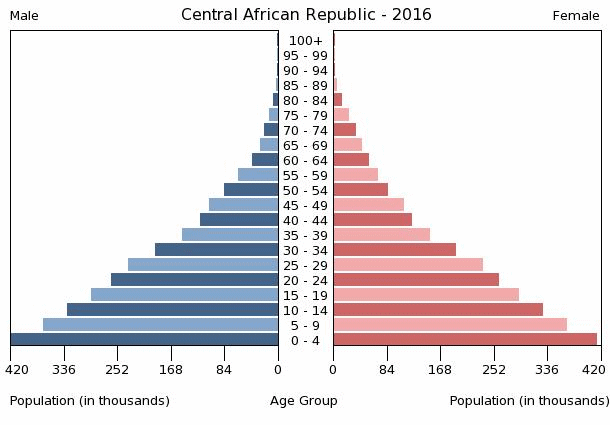Central African Republic - Health
Average life expectancy is 49.4 years (males: 46.9, females: 51.9). Education is compulsory for ages 6 to 14. However, only 58 percent of children attend primary school, and only 12 percent attend secondary school. The percentages are much lower for girls; family demands often preclude continuing school attendance.
This is a tropical country where parasites are an endemic problem. It is a place where communicable diseases like measles, whooping cough, tetanus, and polio have not yet been conquered. It is a country where malnutrition, tuberculosis, gastro-enteritis, and pneumonia are embedded in the way people live, and the people's lack of resources and education. All of these problems are heightened by migrations to the cities where homes are crowded, food is even more scarce, and one is removed from the emotional support of friends and neighbors.
Diarrheal diseases caused by bacteria, protozoa, and viruses are the greatest risk to deployed forces. Typhoid and paratyphoid fever epidemics occur sporadically. Risk of contracting hepatitis A and E is high. Consumption of unpasteurized dairy products or raw animal products increases the risk of contracting many diseases including brucellosis.
The main insect-borne disease risks in C.A.R. are mosquito-borne, including malaria; yellow, dengue, Rift Valley, and West Nile fevers; and Chikungunya and Sindbis virus diseases. Malaria poses risk year-round and countrywide. African trypanosomiasis (sleeping sickness) is transmitted by the tsetse fly and may occur countrywide. Other insect-borne diseases include leishmaniasis, African tick typhus, filariasis (elephantiasis), onchocerciasis (river blindness), and flea- and louse-borne typhus.
Sexually transmitted diseases (STDs), including gonorrhea and syphilis, pose a high risk, and some infections may be drug resistant. HIV/AIDS rates of more than 33 percent have been reported among rural populations; transmission primarily is heterosexual. Hepatitis BID and C, caused by exposure to infective body fluids, are also risks.
Acute respiratory infections pose risks, particularly in crowded living conditions. Risk of contracting acute respiratory infections such as colds, pharyngitis, bronchitis, pneumonia, and influenza are year-round and countrywide and may be related to increased contact with local populations.
Water should be boiled and filtered before consumption. Most locals do not purify their water due to the cost of firewood, bleach, and iodine.
Alcoholism is prevalent in the C.A.R., generally among men. Several types of homemade alcoholic beverages are consumed regularly basis: mbako, a hard alcohol fermented from manioc; duma, a honey beer; and bili-bili. Palm wine, tapped from palm trees, is popular in the south. There may be health risks associated with consuming these homemade varieties of alcohol.
The quality of health care in the C.A.R. is far below Western standards. The national health system carmot provide adequate care for the population; only 13 percent of the population has access to health care. Eighty percent of available health care is in Bangui, the capital. Funding is inadequate to maintain medical facilities. The quality of training at the country's only medical school has declined. Some physicians are sent to Europe and the U.S. for specialized training. The qualifications of physicians vary greatly, but most physicians perform below Western standards. Foreign physicians outnumber native physicians, and are probably more competent.
No medical facility is adequate for treating massive trauma, burns, or other conditions needing advanced emergency or surgical care. Funding is insufficient for facility maintenance. Sanitation is poor.

|
NEWSLETTER
|
| Join the GlobalSecurity.org mailing list |
|
|
|

